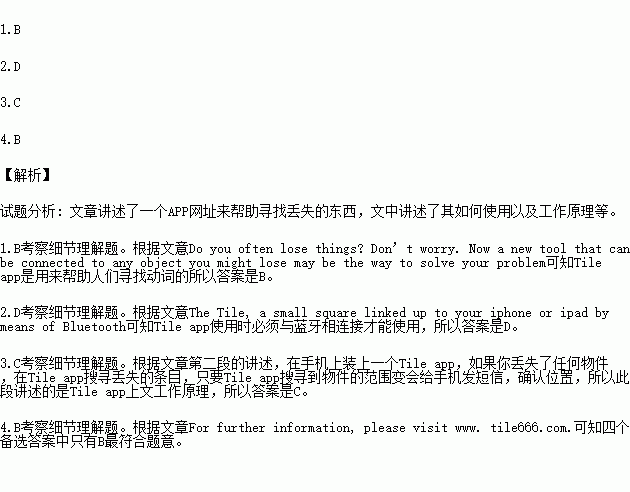题目内容
Do you often lose things? Don’t worry. Now a new tool that can be connected to any object you might lose may be the way to solve your problem. The Tile, a small square linked up to your iphone or ipad by means of Bluetooth, lets you see how close you are to your missing item, within a 50-to-150-foot range. If the item goes out of your phone’s 150-foot range, it can still be found on other smart phones with the same app.
When you drive the app on your phone, it shows you, with green bars that increase or decrease, how close or far away you are from the Tile. You can also program it to make a sound when you get close to the Tile. And you can link up your phone with up to ten Tiles. And if your lost object—a dog, for example, or a stolen bike—go out of your own phone’s 150-foot Bluetooth range, you can set it as a “lost item”. If any of the phones with the Tile app comes within range of your lost item, a message will be sent to your phone, telling you its position. The Tile app also has the function to remember where it last saw your Tile, so that you can easily find where you left it.
Since the Tiles use Bluetooth rather than GPS, they are never out of battery or needn’t to be charged, and they work for one year before needing to be replaced. And the app works with all generations of iPhones and iPads.
For further information, please visit www. tile666.com.
1.What can the Tile app help you ?
A. To use your phone more wisely
B. To find your missing items
C. To save your phone’s power
D. To find other phone users
2.Which of the following is TRUE according to the passage?
A. The Tile needs to be charged after a year of use.
B. One smart phone can only be linked up with one Tile.
C. A missing item can’t be found if it goes out of your phone’s Bluetooth range.
D. The Tile cannot be linked up with a phone without Bluetooth.
3.What does the second paragraph mainly tell us?
A. What the Tile app is.
B. The advantages of the Tile app.
C. How the Tile app works.
D. Why the Tile app was created.
4.Where does the passage probably come from?
A. A health report. B. An advertisement.
C. A personal diary D. Science fiction.
 步步高达标卷系列答案
步步高达标卷系列答案
